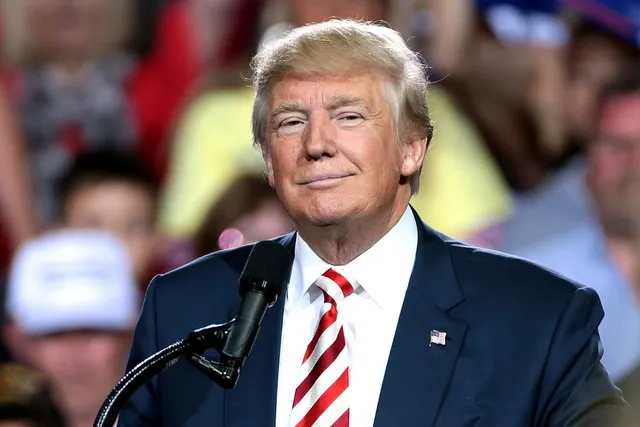TIME’s new cover: Is truth dead? https://t.co/DGPygUNsEZ pic.twitter.com/Tm8U1rSWtB
— TIME (@TIME) March 23, 2017
Donald Trump gave an interview to Time Magazine Wednesday, and rather than format it into a typical profile, they published the transcript with only light editing, removing Trump’s interactions with his aides and one off-the-record exchange. (Wow, would I love to know what that was.) Possibly, this choice to lay his words bare was made to avoid giving Trump and his supporters a chance to claim the interview was skewed, as he predicted during the interview itself, saying “I know you are going to write a bad article because you always do.”
Or maybe they left the transcript intact because I honestly have no idea how you would translate his words into something that makes any kind of sense. For example, the interviewer, TIME Washington Bureau Chief Michael Scherer, started off by asking Trump, “Do you want me to give you a quick overview [of the story]?”
Here was his response to that question (links are all Time’s, because I guess they couldn’t resist trying to give some semblance of context):
Yeah, it’s a cool story. I mean it’s, the concept is right. I predicted a lot of things, Michael. Some things that came to you a little bit later. But, you know, we just rolled out a list. Sweden. I make the statement, everyone goes crazy. The next day they have a massive riot, and death, and problems. Huma [Abedin] and Anthony [Weiner], you know, what I tweeted about that whole deal, and then it turned out he had it, all of Hillary’s email on his thing. NATO, obsolete, because it doesn’t cover terrorism. They fixed that, and I said that the allies must pay. Nobody knew that they weren’t paying. I did. I figured it. Brexit, I was totally right about that. You were over there I think, when I predicted that, right, the day before. Brussels, I said, Brussels is not Brussels. I mean many other things, the election’s rigged against Bernie Sanders. We have a lot of things.
So, presumably, Trump knew that the premise of the article was his credibility issues and penchant for tweeting and saying false or unverified statements. But what kind of a hyperactive Mad Libs response is that? “Brussels is not Brussels”? Totally unsolicited mentions of Bernie and Hillary? (But sure, it’s the liberals who can’t get over the election results, right?) Yes, leaving the words to speak for themselves is probably the best move, because otherwise it’s just an instant checkmate, with the win going to Trump’s total lack of interest in logic or sense.
And that seems to be the point of the entire article. Scherer’s questions focus consistently on the things Trump has said and tweeted that were unverified or untrue, and Trump consistently responds with twisted logic that “proves” himself right–like how on a Saturday in February, he spoke about a nonexistent incident that happened in Sweden the night before. But when a riot broke out in Sweden the following Monday, he used that as retroactive proof that he was right, and that everyone who called him out of making up an event was buying into “fake news.”
He said similar things about his claims of Brussels being in turmoil, months before last year’s attacks on the city. And just before the interview, Devin Nunes told Trump (rather than the investigative committee) of his alleged knowledge of “incidental” information collected from surveillance of Trump and his transition team. That vague information, released in a totally unorthodox, arguably corrupt manner that undermines all current investigations, and for which he has since apologized, is now, in Trump’s eyes, proof that his “wiretapping” claims were valid.
If there’s something Scherer brings up that hasn’t been, in one twisted form or another, “proven” right, Trump seems actually incapable of admitting he was wrong. Often, he maintains that he could still be proven right, flinging out responses of “We’ll see,” and “You watch.”
More often, though, he gives his latest favorite go-to line. When it looks like something he said might be so outlandishly false he can’t get around it, he claims his words weren’t his own. He was merely “quoting.” Scherer reminds him that he once said Ted Cruz’s father worked with Lee Harvey Oswald, and Trump responds that he was just “quoting the newspaper.” If he says things that sound bizarre and false, he says, “Well, I’m not, well, I think, I’m not saying, I’m quoting, Michael, I’m quoting highly respected people and sources from major television networks.”
He’s not saying. He’s quoting. It doesn’t matter to him, that, as pointed out, “traditionally people in your position in the Oval Office have not said things unless they can verify they are true.” Irrelevant, to him. He was just quoting somebody else. The clear subtext being, just let it go.
No matter what, no matter the statement or the context, he’s always right and everyone else is a fake-news-loving hater and one of his “many enemies.” And that’s the way he wants it. He’s more proud of being right than of anything else. Just this week, he retweeted this observation from conservative radio host Bill Mitchell:
Trump always ends up being right. It’s almost a little freaky.
— Bill Mitchell (@mitchellvii) March 22, 2017
It takes a certain kind of mind to see that as a compliment. At least, if you’ve been paying attention to how he ends up “being right.”
To Trump, winning an argument (by any means, even a refusal to comply to basic logic) is the same thing as being correct. Convoluted logic manipulated to construct a perception of being right is the same as facts. Winning is the same as truth. Has anything ever summed up Donald Trump’s view of himself and the world than the words he chose to end this interview?
I can’t be doing so badly, because I’m president, and you’re not.
He is in the White House. Therefore, everything he does is right. No matter what he says or does, he already won. His only goal is, truly, to trump us. (The name his family chose–Drumpf, remember, being the original surname–seems also to be their creed.) And he believes he’s done that.
That word is defined as to “beat (someone or something) by saying or doing something better,” or “to get the better of.” In no way does Trump care about the betterment of the American people or the world. As he so clearly views it, the best choice, always, is what allows him to win, to be right, to trump us.
(image via Gage Skidmore / Flickr)
—The Mary Sue has a strict comment policy that forbids, but is not limited to, personal insults toward anyone, hate speech, and trolling.—
Follow The Mary Sue on Twitter, Facebook, Tumblr, Pinterest, & Google+.










Published: Mar 23, 2017 04:00 pm